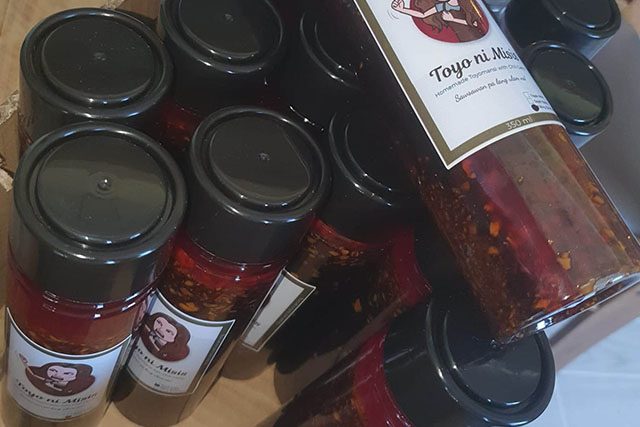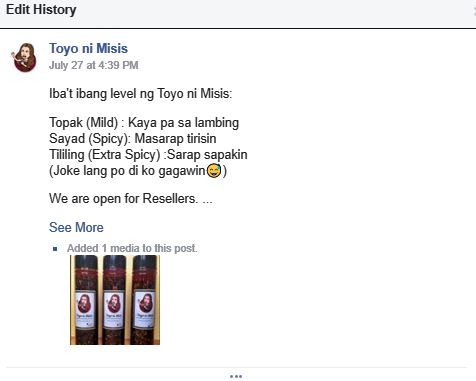
Owners of a local startup business released a clarification about their social media post that was perceived to promote domestic violence and sexism by some members of the local online community.
Toyo ni Misis, a condiment brand of homemade “toyomansi” (or soy sauce with calamansi) shared a picture of its products on Facebook on Monday that had the original caption as part of its advertisement:
Iba’t ibang level ng Toyo ni Misis:
Topak (Mild) : Kaya pa sa lambing
Sayad (Spicy): Masarap tirisin
Tililing (Extra Spicy) :Sarap sapakin
(Joke lang po di ko gagawin😅)

The post was accompanied by pictures of three variants of the condiment, “Topak” (mild), “Sayad” (spicy) and “Tililing” (Extra Spicy).
It failed to amuse some Filipinos who argued that the caption, specifically the way it was advertised, appeared to promote “domestic violence” and “sexism.”
The post made its way to a local online community of creatives who shared their insights about the topic.
A member of the group said that the brand “clearly trivializes the horrific scale of domestic violence in the country” and sought for Filipinos to report its Facebook page for supposed violence and hate speech.
Another member commented that the remarks of “sarap sapakin” and tirisin” were “foul”
“It’s gonna cultivate disrespect against women,” he added.
“To think of all the women killed everyday by their domestic partners, grabe yung ganitong capitalization of violence. Sobra,” wrote another member.
A member likewise said that the brand name was “offensive” as well since “it plays on a stereotype of women being ‘moody’ all the time” or being “temperamental.”
“The saying ‘may toyo nanaman si misis/jowa’ makes it out that the woman is being unreasonably mad/irritated ‘again.’ It’s been so ingrained in our culture, we don’t even realize that it’s a form of gaslighting and definitely a microaggression,” she added.
Another member pointed out: “Sexism shouldn’t be cool and tolerated in 2020. Kung sasabihin ng isang ad ng, for example, washing machine: ‘Para sa mga nanay na nakapangasawa ng mga tatay na alagain, pampadali ng trabaho ang aming washing machine’, wouldn’t you all think it’s unfair to assume all men are full grown babies?”
Following the criticisms, the owners of the condiment brand released two posts on its page and explained their side. It also edited the controversial caption to the following instead:
“Mister T,” one of the owners, denied that they were supposedly promoting “domestic violence of any form” and apologized to those who were offended.
“Our intention (to) promote our startup business (was) based on our experience and humor as a married couple,” he said in a post.
“In short walang perfect relationship, we get annoyed by little things, we fight. Aminin man natin o hindi, we all have our fair share of misunderstandings. Marriage is not always rainbows and butterflies,” the owner called “Mister T” added.
In a follow-up post, the couple maintained that they did not intend to promote abuse or violence and added in wanting to sell their homemade condiments.
“Maraming salamat po uli sa pagpansin sa aming munting kabuhayan. Pasensya na po uli sa mga nasaktan. Peace be with you all,” they said.
Meanwhile, the wife in an interview with Spot.ph explained that the “Toyo ng Misis” was her idea based on their personal dynamics as a couple.
“My husband and I love sawsawan. I like to put calamansi on everything and he loves chili since he is from Bicol. We were (displaced) during this pandemic and we want to start selling something with low production cost since we lack capital,” she said, as quoted by the website.
“We’ve been together for 15 years. Toyo, sumpong, (and) tampuhan (have) been part of our relationship. Actually, idea ko ‘yung Toyo ni Misis since naging biruan nga namin. As for the toyo levels, since we have different tolerance for spiciness, (we) created levels para mas maraming maka-enjoy no’ng product.”
The wife said the product names originated from the names her husband, “Mister T,” would jokingly call her different moods.
“We laughed about it, showed it to our friends and natuwa naman sila, maybe because they know us as a couple na mahilig mag-asaran. Or we have the same point of view. We never thought na offensive pala sa iba ‘yong terms na ginamit namin. Plus, the description, which they view as promoting violence. So we (edited) out that caption and just retained the spiciness levels,” she added.
On domestic violence and gender stereotypes
Last April, the Commission on Human Rights urged the government to address the rising cases of domestic violence linked to quarantine lockdowns in which the public is advised to be homebound.
UN Women in a report noted that around 243 million women and girls aged 15-49 globally have been subjected to sexual and/or physical violence perpetrated by an intimate partner in the past 12 months.
“Emerging data shows that since the outbreak of COVID-19, reports of violence against women, and particularly domestic violence, have increased in several countries as security, health and money worries create tensions and strains accentuated
by the cramped and confined living conditions of lockdown,” it said.
Meanwhile, gender-based stereotypes affect the way on how women view themselves and how they expect to be treated.
Brenda Curtis a former assistant professor of Psychology in Psychiatry at Penn Medicine, noted that “there are gender-based stereotypes about women being irrational, hysterical, and disconnected from reality—all meanings that are associated with the word ‘crazy.'”
Dating coach Harris O’Malley said that stereotyping women as “crazy” whenever she is emotional or upset stigmatizes people who have legitimate mental health issues and implies women do not understand their own emotions.
“It tells women that they don’t understand their own emotions, that their very real concerns and issues are secondary to men’s comfort. And it absolves men from having to take responsibility for how we make others feel,” he wrote in The Washington Post.









